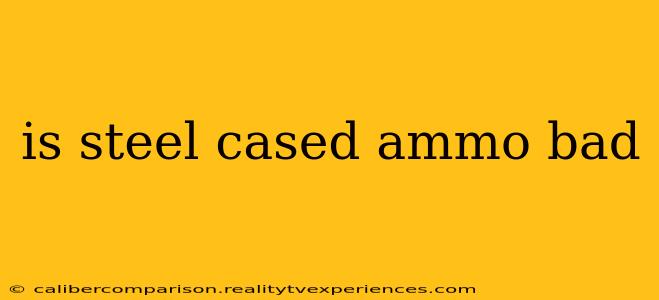The question of whether steel-cased ammunition is "bad" is complex and often fueled by misinformation. The truth is, steel-cased ammo has its advantages and disadvantages, and whether it's suitable for your needs depends entirely on your specific use case. Let's delve into the facts and separate the myths from reality.
Understanding Steel-Cased Ammunition
Steel-cased ammunition, as the name suggests, uses steel rather than brass for its casing. This difference in material significantly impacts several aspects of the cartridge, influencing cost, performance, and potential drawbacks.
Advantages of Steel-Cased Ammo:
- Cost-Effectiveness: The most significant advantage is its lower price point. Steel is significantly cheaper than brass, leading to lower production costs and more affordable ammunition for consumers. This makes it a popular choice for high-volume practice shooting.
- Durability (in some cases): Steel casings can be more resistant to certain types of damage, like dents and impacts, compared to brass. However, this is not always the case and depends heavily on the quality of the steel used.
- Availability: Steel-cased ammo is generally more readily available, especially during periods of high demand or supply chain disruptions affecting brass production.
Disadvantages of Steel-Cased Ammo:
- Potential for Damage to Firearms: This is perhaps the most debated point. While not inherently damaging to all firearms, steel casings can cause increased wear and tear on certain firearms, particularly those with delicate extractors or ejectors. The harder steel can be more abrasive than brass, potentially leading to faster wear. This is more of a concern with semi-automatic pistols and rifles, where the cycle of operation is more frequent and forceful. Revolvers generally have less concern as they don't experience the same mechanical stress.
- Reduced Accuracy (in some cases): Some shooters report slightly reduced accuracy with steel-cased ammo, though this is often anecdotal and can depend on the quality of the ammunition and firearm. The consistency of the casing's dimensions can also be a factor. High-quality steel-cased ammunition from reputable manufacturers often performs similarly to brass-cased ammunition.
- Potential for Rust: Steel casings are susceptible to rust, especially in humid environments. Proper storage is crucial to prevent deterioration.
- Not suitable for all firearms: Some manufacturers specifically prohibit the use of steel-cased ammunition in their firearms due to concerns about damage to the firearm. Always consult your firearm's owner's manual before using steel-cased ammo.
Myths about Steel-Cased Ammo:
- Myth: Steel-cased ammo is inherently unsafe. Reality: The safety of steel-cased ammo depends largely on the quality of the ammunition and its proper use in a compatible firearm. Poorly manufactured steel-cased ammunition poses a risk, just as poorly manufactured brass-cased ammunition does.
- Myth: Steel-cased ammo is always less accurate. Reality: Accuracy can vary based on several factors, including manufacturing quality, ammunition design, and the firearm used. High-quality steel-cased ammo can provide acceptable accuracy for many applications.
- Myth: All firearms are compatible with steel-cased ammo. Reality: Some firearms are explicitly designed not to be used with steel-cased ammo, and using it could cause damage.
Conclusion: Making the Right Choice
Ultimately, the decision of whether or not to use steel-cased ammunition hinges on your specific needs and priorities. If cost is a major factor and your firearm is compatible, steel-cased ammo can be a practical and effective option for practice shooting. However, if accuracy and the longevity of your firearm are paramount, or your firearm's manufacturer explicitly advises against it, opting for brass-cased ammunition is the safer and potentially more reliable choice. Always prioritize firearm safety and consult your firearm's manual before using any type of ammunition.

